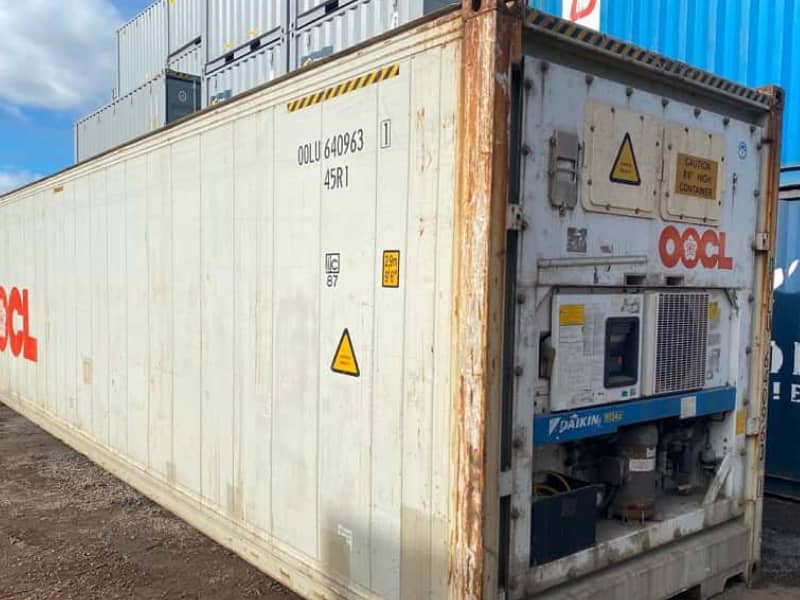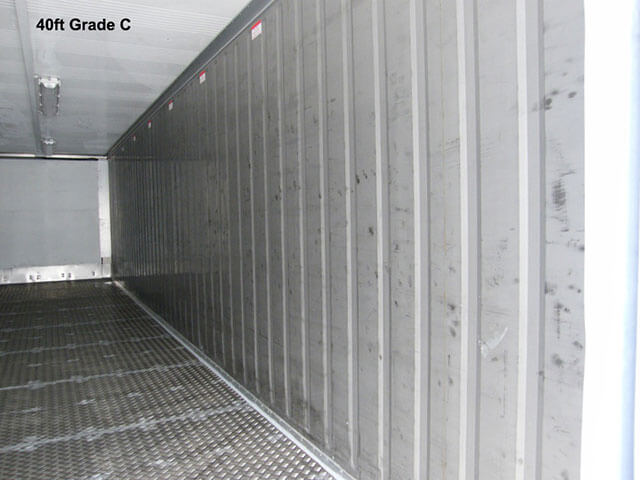All About Freezer Containers: Essential Insights for Your Storage Space Needs
Cold store containers play an essential role in the preservation of disposable products. They can be found in various forms, consisting of chilled and insulated units, each created for details storage space requirements. Understanding the benefits and key functions of these containers is vital for businesses aiming to optimize their operations. As the demand for reliable storage remedies expands, exploring the different alternatives available can lead to informed decisions that affect both profitability and sustainability. What aspects should one consider when picking the appropriate container?
Sorts Of Cold Store Containers
Cold storage containers been available in various types, each developed to fulfill certain temperature control needs. Amongst the most usual kinds are chilled containers, which preserve temperatures in between 0 ° C to 10 ° C, making them ideal for disposable products like fruits, veggies, and dairy items. One more kind is the deep fridge freezer container, which operates at temperatures listed below -18 ° C, perfect for long-lasting storage space of icy items such as meats and fish and shellfish.
Insulated containers offer temperature stability without active air conditioning, making them useful for temporary transportation of temperature-sensitive products. Additionally, there are mobile cold storage space units, which supply flexibility in places and are usually made use of in occasions or seasonal operations. Lastly, blast chillers quickly minimize the temperature of warm foods, guaranteeing safety and high quality. Each kind serves a special function in various sectors, from food service to pharmaceuticals, stressing the value of choosing the right container for certain storage needs.

Benefits of Using Cold Store Solutions

Chilly storage services expand the shelf life of items, reducing waste and raising success for businesses. By effectively handling stock with correct temperature level control, business can maximize their supply chains and enhance functional effectiveness.
Furthermore, cold store facilities permit adaptable storage space choices, fitting different volume needs and seasonal variations in demand (used 40ft refrigerated shipping containers). This versatility aids businesses react swiftly to market changes
Finally, using cold store solutions can assure compliance with health and wellness guidelines, securing both consumers and businesses. Generally, the strategic use cold storage space improves product monitoring while advertising sustainability and financial viability.
Key Attributes to Look for in Freezer Containers
When choosing cool storage containers, a number of essential functions quality mindful factor to consider to protect peak efficiency and dependability. First, temperature control abilities are crucial; containers need to maintain regular temperature levels suitable for details items. Insulation high quality also plays a significant duty, as superior insulation reduces energy intake and boosts temperature level stability.
Next off, convenience of gain access to and loading is vital; containers need to use straightforward styles for reliable handling and organization. Toughness is an additional vital element; weather-resistant materials guarantee longevity and protect contents against ecological factors.
Furthermore, mobility features, such as integrated wheels or raising factors, assist in transportation, while customizable formats permit customized storage services.
Lastly, checking systems, consisting of temperature alarms and remote tracking, supply real-time updates, ensuring that conditions remain suitable. By concentrating on these attributes, customers can select cold storage containers that fulfill their operational demands effectively.
Selecting the Right Freezer Container for Your Demands
Picking the ideal freezer container needs a thoughtful analysis of details needs and functional needs. Aspects such as the type of items being kept, temperature level sensitivity, and quantity needs to be focused on. Disposable food products might demand containers with strict temperature level controls, while drugs may need specific problems to preserve efficacy.
Furthermore, prospective individuals need to take into consideration the container's dimension and mobility. A larger unit might be essential for bulk check over here storage space, while smaller, mobile options might be optimal for momentary or on-site needs. Insulation top quality and energy effectiveness are also vital, as these will certainly affect functional costs and temperature security.
Finally, compliance with industry guidelines and criteria is important, especially in fields like food and medical care. By very carefully evaluating these facets, customers can choose a freezer container that properly satisfies their unique requirements and warranties ideal storage space conditions.
Finest Practices for Keeping Freezer Issues
Keeping ideal cold store conditions is important for maintaining the high quality and security of temperature-sensitive products. Frequently checking temperature level and humidity levels is important; using dependable electronic thermometers and hygrometers can give exact readings. Additionally, correct insulation of cold store containers aids lessen temperature level variations and energy loss.
Applying a first-in, first-out (FIFO) system ensures that older inventory is utilized prior to newer supply, lowering waste (used 40ft refrigerated shipping containers). Furthermore, preserving an arranged format within the storage area permits much better airflow and reduces the risk of cross-contamination
Regular maintenance examine devices, such as compressors and seals, are very important to stop malfunctions. Personnel training on best practices for filling and unloading items assists maintain temperature level stability. Lastly, keeping doors closed as long as feasible limits warm exchange, assuring that the cold store setting remains efficient and steady in protecting beneficial products.
Cost Considerations for Cold Storage Solutions
When examining freezer solutions, it is crucial to think about the first investment prices together with ongoing operational expenditures. A comprehensive breakdown of these expenses can reveal considerable lasting financial savings possibility for services. Recognizing these monetary facets assists stakeholders make informed choices regarding their cool storage space needs.

Preliminary Investment Prices
The monetary landscape of freezer containers offers various first investment expenses that companies need to think about. These costs normally consist of the acquisition or rental cost of the containers, which can differ based on insulation, kind, and dimension high quality. In addition, expenses connected to retrofitting existing structures to suit freezer must be factored in, especially if specialized devices is needed. Setup prices, consisting of electrical work and refrigeration systems, also add to the total initial investment. Services should not neglect transport costs for delivering containers to their wanted place. Finally, possible personalization options, such as shelving or temperature level monitoring systems, can even more impact the preliminary economic expense. Mindful budgeting for these variables is vital for effective cold store application.
Functional Expenses Breakdown
Operational expenditures for freezer services incorporate numerous essential cost factors to consider that companies need to navigate. Secret factors include energy costs, which can be considerable because of the demand to preserve reduced temperature levels. Upkeep expenses are likewise significant, as normal servicing is necessary to ensure tools operates successfully and stays compliant with wellness and safety and security criteria. Additionally, labor prices might emerge from the need for specialized staff to monitor the storage space and handle atmosphere. Insurance coverage expenditures are another factor to consider, as companies need to secure their investments versus potential losses. Ultimately, any potential regulatory conformity prices must be factored in, as services may require to purchase systems that follow food security and environmental guidelines. Recognizing right here these costs is important for effective budgeting.
Long-Term Cost Savings Potential
Purchasing cold storage space solutions provides considerable long-lasting cost savings capacity, transforming initial expenditures right into financial performance gradually. By lessening perishing and waste, businesses can enhance their earnings margins considerably. Advanced insulation and energy-efficient systems lower energy expenses, which build up over the life expectancy of the devices. Moreover, chilly storage containers often require much less regular maintenance contrasted to traditional refrigeration methods, leading to reduced repair work expenditures. The capability to shop products for extensive periods without endangering quality allows services to take advantage of market variations, enhancing earnings. In addition, the scalability of cold storage solutions makes it possible for business to adapt to changing needs without incurring extreme prices. In general, these aspects add to a compelling situation for freezer as a cost-efficient financial investment strategy.
Often Asked Inquiries
Exactly How Long Can Food Be Stored in Cold Storage Containers?
The duration food can be saved in cold store containers varies by type. Typically, disposable products last from days to weeks, while frozen foods can continue to be safe for months, relying on correct temperature level and storage space conditions.
Are Cold Storage Space Containers Energy-Efficient?
The power performance of cold store containers differs based upon design and insulation quality. Modern devices often utilize sophisticated modern technology to lessen energy consumption, eventually adding to minimized operational costs and ecological impact in long-lasting use.
Can Freezer Containers Be Custom-made for Certain Needs?
Cold store containers can certainly be customized to meet particular requirements. Modifications may consist of temperature level controls, dimension changes, and additional functions, allowing individuals to customize options successfully for various storage demands and functional preferences.
What Are the Typical Sizes of Freezer Containers?
Freezer containers commonly are available in standard sizes such as 10, 20, and 40 feet. These measurements accommodate numerous storage requirements, making sure adaptability for services needing temperature-controlled atmospheres for sensitive products or perishable goods.
Do Freezer Containers Require Special Permits for Use?
Freezer containers usually call for special permits for use, relying on neighborhood policies and planned applications. Authorities might mandate authorizations to ensure safety and security standards, environmental conformity, and appropriate functional methods are maintained throughout their usage.
Cold storage space containers come in numerous kinds, each developed to satisfy details temperature control needs. Additionally, cold storage facilities permit for flexible storage space choices, fitting various quantity needs and seasonal fluctuations in need. Selecting the best cool storage space container calls for a thoughtful evaluation of certain needs and operational needs. The economic landscape of cool storage containers presents numerous initial financial investment expenses that businesses need to consider. Cold storage space containers can undoubtedly Learn More be customized to fulfill specific needs.